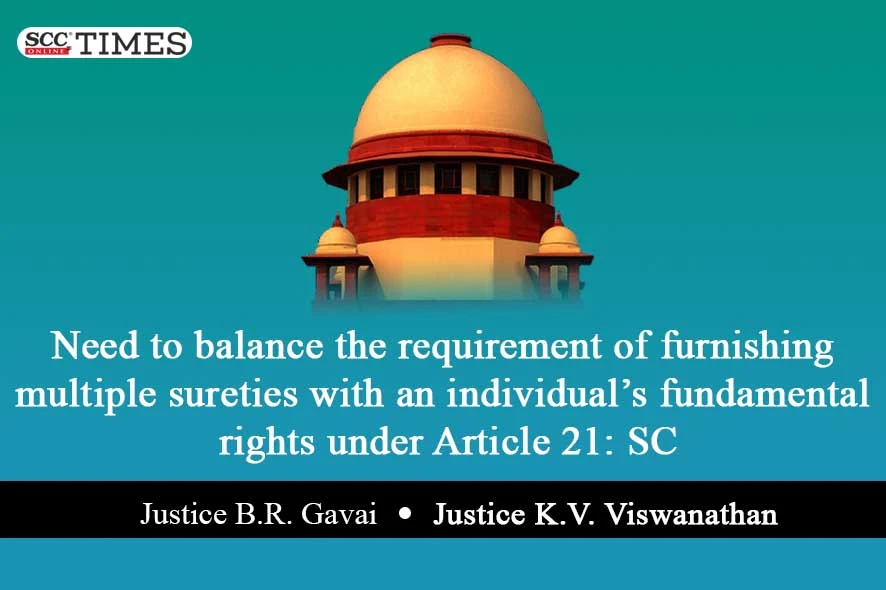Supreme Court: While considering the instant petition wherein the Court had to consider whether the petitioner was entitled to the relief of treating the personal bond and one set of sureties already furnished as holding good, for the other bail orders as well; the Division Bench of B.R. Gavai and K.V. Viswanathan*, JJ., took note of the petitioner’s genuine difficulty in finding multiple sureties stating that Sureties are essential to ensure the presence of the accused, released on bail. At the same time, where the Court is faced with the situation where the accused enlarged on bail is unable to find sureties, as ordered, in multiple cases, there is also a need to balance the requirement of furnishing the sureties with his or her fundamental rights under Article 21 of the Constitution. “An order which would protect the person’s fundamental right under Article 21 and at the same time guarantee the presence, would be reasonable and proportionate. As to what such an order should be, will again depend on the facts and circumstances of each case”.
Background:
13 FIRs were registered against the petitioner in 6 States namely- Uttar Pradesh, Uttarakhand; Punjab; Haryana, Rajasthan and Kerala, under Sections 406, 420 and 506 of Penal Code, 1860, in which the petitioner had been granted bail, but was ordered to pay sureties for each of them. As per the petitioner, he had already furnished personal bail bonds with a sum of Rs. 50,000/- and one surety of Rs. 50,000/- in the Trial Court in respect of FIR registered at P.S. Sadar, Gurugram; and he has fulfilled the conditions of bail with respect to the order passed by the Additional Chief Judicial Magistrate, Thalassery, Kerala in FIR registered at P.S. Pinarayi, Kerala.
The main plea of the petitioner was that he is not in a position to furnish separate sureties, as directed in the remaining 11 bail orders. Therefore, he sought to treat the sureties already furnished in two cases in such a manner as to enure to the benefit of all the other 11 cases.
Opposing the plea, State of Uttar Pradesh argued that for each crime number, separate surety is required, and a bond of one surety cannot be mixed up with the bond executed or to be executed in other cases against different crime numbers. Similarly, the State of Rajasthan contended that separate sureties are required, and a common surety cannot be made liable to pay the amount in excess of the amount of bond that he/she furnishes. State of Uttarakhand also averred that separate personal bond, and sureties ought to be furnished insofar as the sole FIR pending in the State is concerned.
Court’s Assessment and Decision:
The Bench clarified that their assessment in the instant matter focuses only on the 11 FIRs in which bail has already been granted, and whether there could be any order for consolidation of sureties and, if so, then in what manner.
The Court noted that it is undisputed that the petitioner stands enlarged on bail in 13 matters and the bail orders have become final and have not been challenged by the prosecution. It is also undisputed that in two FIRs registered at P.S. Sadar, Gurugram and P.S. Pinarayi, surety already stands furnished. The situation at present is that despite obtaining bail, the petitioner has not been able to furnish the sureties.
The Court perused Sections 441 and 446 of CrPC, which deal with bond of accused and sureties and procedure when bond has been forfeited, respectively. It was observed that the petitioner has already furnished surety in 1 case registered against him in Kerala. Insofar as Haryana is concerned, out of the 2 cases, petitioner has furnished sureties in 1 case and in the other case, a Fixed Deposit Receipt (FDR) for a sum of Rs. 1,00,000, has been ordered. The Court did not interfere with this order.
Referring to the dictionary meaning of ‘surety’, the Court observed that it means “a person who takes responsibility for another’s obligation” or “the bail that undertakes for another man in a criminal case”. The Court further observed that the choice as to who should be a surety is a limited one and it will often be a close relative or a longtime friend. However, in a criminal proceeding, the circle may get even more narrowed as the normal tendency is to not disclose about the said criminal proceeding to relatives and friends, to protect one’s reputation. “These are hard realities of life in our country and as a Court of law we cannot shut our eyes to them. A solution, however, has to be found strictly within the framework of the law”.
The Court further noted that the principle has always been that excessive bail is no bail. “To grant bail and thereafter to impose excessive and onerous conditions, is to take away with the left hand what is given with the right”. As to what is excessive, it will depend on the facts and circumstances of each case. Perusing the instant case, the Court opined that the petitioner is experiencing a genuine difficulty in finding multiple sureties.
Emphasising on the necessity of surety, the Court also highlighted the need to balance an individual’s fundamental right under Article 21 and with the need to furnish multiple sureties. The Court further noted In Re Policy Strategy for Grant of Bail in SMWP (Criminal) No. 4/2021, 2023 SCC OnLine SC 483, wherein the Supreme Court had stated that, “If the bail bonds are not furnished within one month from the date of grant bail, the concerned Court may suo moto take up the case and consider whether the conditions of bail require modification/relaxation. One of the reasons which delays the release of the accused/convict is the insistence upon local surety. It is suggested that in such cases, the courts may not impose the condition of local surety.”
The Court noted the FIR against the petitioner registered in Udaipur, Rajasthan, where an order for providing a local surety was passed. The Court pointed out that the petitioner hails from Haryana and to secure a local surety will be an arduous task for him. This condition has virtually rendered the order for bail ineffective.
The Court relied on Moti Ram v. State of Madhya Pradesh, (1978) 4 SCC 47, where V.R Krishna Iyer, J., opined that “What law prescribes sureties from outside or non-regional language applications? What law prescribes the geographical discrimination implicit in asking for sureties from the court district? This tendency takes many forms, sometimes, geographic, sometimes linguistic, sometimes legalistic. Article 14 protects all Indians qua Indians, within the territory of India”. Therefore, the Court proposed to relieve the petitioner from the direction to produce a local surety.
The Court further directed that for the FIRs pending in Uttar Pradesh, Rajasthan, Punjab and Uttarakhand, in each State, the petitioner will furnish his personal bond for Rs. 50,000 and furnish two sureties, who shall execute the bond for Rs. 30,000 each, which shall hold good for all FIRs in the State concerned. The same set of sureties will be permitted to stand as surety in all the States. This condition will supersede the condition imposed in the respective bail orders. “We feel that this direction will meet the ends of justice and will be proportionate and reasonable”.
CASE DETAILS
|
Citation: Appellants : Respondents : |
Advocates who appeared in this case For Petitioner(s): For Respondent(s): |
CORAM :










